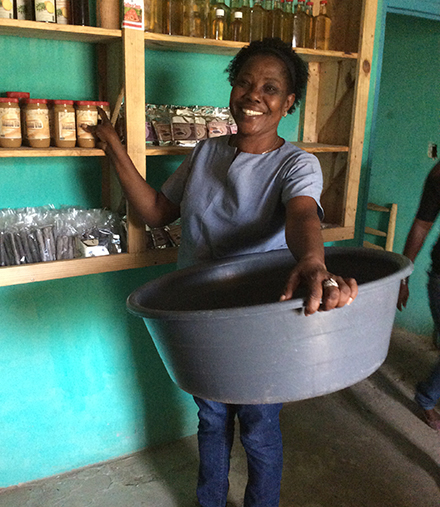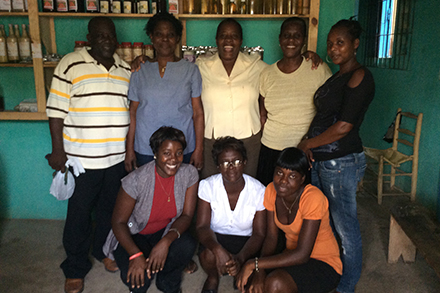In the North West region of Haiti, a loan of just $50 can mean the difference between struggling to survive and becoming a successful entrepreneur. Knowing this, the women in the communities of Saint Louis du Nord and Anse a Foleur came together in March of 1995 and formed the Coordination of Association for Women Development in Saint Louis du Nord and Anse a Foleur (CAFDESA in French.)
Heifer’s goal is to help project participants have sufficient income and assets to meet basic needs such as housing, food, nutrition, clothing, education and health services. Heifer also works to empower women, making sure that they have the ability to make decisions and affect outcomes of importance for themselves and their families.
Income and women’s empowerment are the basis for programs like CAFEDESA, which extends its membership over nine communal sections in the North West region of Haiti. It is a community-based organization that has 10,700 members with 11 elected committee members. The participants’ goal is to organize themselves into smaller groups and pursue their interests in agriculture and entrepreneurship, while supporting one another and sharing experiences.

Today, CAFDESA has many ongoing activities including agriculture, embroidery, crafts, retail stores and self-help groups called “Mutuelle Solidarité,” which means mutual solidarity. The Mutuelle Solidarité gives small loans to motivated, hardworking women who want to grow their businesses or improve productivity of their farms. Every Friday, a number of members contribute $2, which is recorded in a book kept by the group treasurer. Through tedious record keeping, the group is able to track the contributions of each member to decide on the amount one is entitled to get a loan.
CAFDESA has tried different methods of lending money in the past, but they eventually agreed on the most practical method: borrowing in turns, with each member able to borrow as much as three times their total contribution to be repaid within six months, at an interest rate of two percent. The interest is then pooled into a community fund loaned to members who have emergencies such as death or serious illness.
They’re branching out into other methods for building their savings, too. For nearly three years, CAFDESA has been working with a community agronomist to preserve and process fruits that were wasted during the season. The fruits are bought from members at better prices than offered in the local market. They process and package tomato jam, grapefruit jam, pineapple jam, honey and peanut butter. They also grind coffee and burn cocoa to making cooking chocolate, which they sell at the CAFDESA retail store in Saint Louis du Nord. The proceeds from the sale of these products go to the expansion of the retail store and the Mutuelle Solidarité fund.
In an effort to further empower the women, Heifer Haiti started working with CAFDESA through the Rural Entrepreneurs for Agricultural Cooperation in Haiti (REACH) in April 2013. Seventy women, including the committee members that have been trained on Heifer Cornerstones and other trainings, and each project participant received goats, turkeys, chickens, or other resources. Currently, Heifer Haiti is working with them to strengthen their saving and micro-credit activities. Additional training in financial management, credit and savings is set to begin in the next month.

The women from CAFDESA have big dreams. After training, many members go back to the community and teach friends and family what they have learned, encouraging them to borrow from the Mutuelle Solidarité to buy their own goats and poultry.
Kedna Caprice, the President of CAFDESA, is proud of the accomplishments of these women and says that they have realized that the power to change is in their own hands: “There were women in this organization that had never held a 1000 Gourdes note (about $20.) They had dreams about what they would do if they ever had money.
Through our Mutuelle Solidarité their dreams have come true and I can assure you that today they are a shining source of inspiration for many.”
During a recent visit to the community, George Wilbert, Heifer Haiti’s National Program Manager, advised the women to set their goals and focus on achieving them when the micro-credit project commences. “Things are beginning to change in their households,” He explains. “Their children are able to go to school and have a decent meal every day. Heifer will focus on pursuing a wide micro-credit program with the other women organizations. If you change one woman’s life, she is going to change ten others.”
Prepared by Pamela Nyaga, Heifer Haiti
